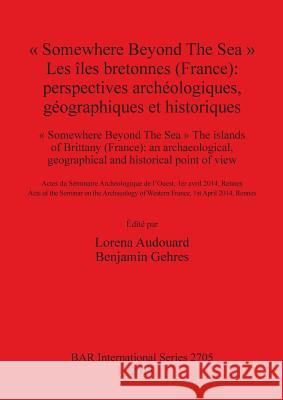Somewhere Beyond The Sea Les îles bretonnes (France): perspectives archéologiques, géographiques et historiques » książka
Somewhere Beyond The Sea Les îles bretonnes (France): perspectives archéologiques, géographiques et historiques
ISBN-13: 9781407313566 / Angielski / Miękka / 2015 / 223 str.
Somewhere Beyond The Sea Les îles bretonnes (France): perspectives archéologiques, géographiques et historiques
ISBN-13: 9781407313566 / Angielski / Miękka / 2015 / 223 str.
(netto: 298,43 VAT: 5%)
Najniższa cena z 30 dni: 304,90 zł
ok. 30 dni roboczych.
Darmowa dostawa!
The Seminar on the Archaeology of Western France, which focused on the islands of Brittany, was held on 1 April 2014 at the University of Rennes 1. The desire to organize this seminar arose spontaneously from the dynamism which currently animates archaeological research on island spaces of the western seaboard of France. Indeed, the seminar took place during a pivotal period of archaeological research covering these islands. A multidisciplinary approach to the question of insularity appears essential, in view of the large amount of research currently undertaken on this topic from the historical, ethnographic and geographical points of view. Accordingly, a comparative analysis of prehistoric and recent island societies would seem to have a true long-term potential for research (to understand in a diachronic way the organization between islands, the relations between large and small islands, the dynamics of exploitation of resources and the degree of dependence with respect to the continent, etc.). Comparisons with other island systems would also offer a particularly rich and relevant approach to refine our study of the problems of insularity. This publication brings together various participants of research on islands, including archeologists, archeometrists, archeomalacologists, geographers, historians, etc.
The Seminar on the Archaeology of Western France, which focused on the islands of Brittany, was held on 1 April 2014 at the University of Rennes 1. The desire to organize this seminar arose spontaneously from the dynamism which currently animates archaeological research on island spaces of the western seaboard of France. Indeed, the seminar took place during a pivotal period of archaeological research covering these islands. A multidisciplinary approach to the question of insularity appears essential, in view of the large amount of research currently undertaken on this topic from the historical, ethnographic and geographical points of view. Accordingly, a comparative analysis of prehistoric and recent island societies would seem to have a true long-term potential for research (to understand in a diachronic way the organization between islands, the relations between large and small islands, the dynamics of exploitation of resources and the degree of dependence with respect to the continent, etc.). Comparisons with other island systems would also offer a particularly rich and relevant approach to refine our study of the problems of insularity. This publication brings together various participants of research on islands, including archeologists, archeometrists, archeomalacologists, geographers, historians, etc.











